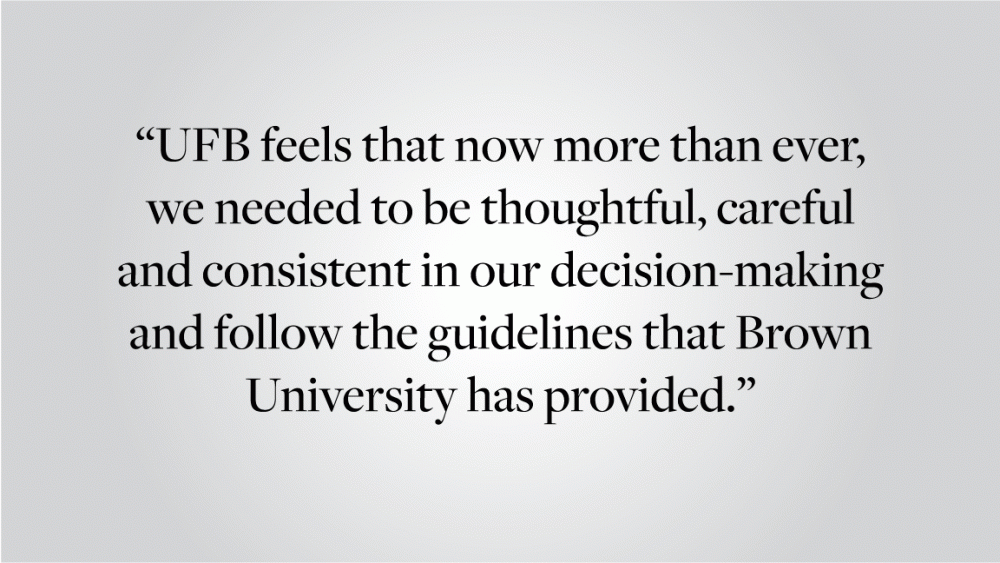In early March, after Brown made the call to finish the semester virtually and cancel all events on campus, the Undergraduate Finance Board was faced with making a number of important decisions. One such decision was whether to permit service groups to donate their unused funds to the greater Providence community, which was struggling to combat the emerging COVID-19 pandemic. After extensive deliberations, UFB opted not to permit such donations. Because some students have expressed confusion and frustration regarding this decision, I would like to offer a full explanation of our rationale.
UFB is a 12-person board elected by the student body to allocate around $2.2 million to student groups every year. The money comes entirely from the “Student Activities Fee,” a $286 fee charged to every undergraduate on top of tuition to support Brown’s many student activities. In determining how funds should be allocated, UFB follows strict University bylaws. One key bylaw, as stated on the Brown bursar page, is that the funds are specifically intended to “support the activities of categorized student organizations.” This is also articulated in UFB’s constitution — that all allocated funds must “directly or indirectly benefit Brown undergraduate students.” Thus, when faced with the question of whether service groups could choose to donate their unused funds to the community last month, UFB concluded that, while those donations would doubtlessly benefit the community, such a diversion of University funds would not be permitted by our bylaws or constitution.
In response, many students argued that community donations could indeed fall under the umbrella of supporting “the activities of categorized student organizations.” Others argued that, because the current situation is unprecedented, UFB should be willing to deviate from its mission and bylaws. I will address each of these concerns separately.
First, why did UFB come to the conclusion that donations to the community beyond Brown do not fall under the umbrella of supporting “the activities of categorized student organizations?” This conclusion was actually not reached by UFB alone, but rather with service group members in March, during a conversation hosted by UFB. The purpose of that conversation was to discuss how UFB could better accommodate the needs of service groups within our policies. This meeting, which all 22 service groups were invited to attend, was the direct result of UFB’s efforts to be fully transparent about our allocations, policies, and process (see our fall data release, our open forum and our spring data release for more context). Together, in addition to deciding to amend UFB’s constitution in order to allow increased funding for service groups, the service group members and UFB decided that, “direct monetary donations to non-Brown organizations fall outside of the purpose of UFB and should therefore not be funded.” (This quote is pulled directly from the meeting notes of that discussion.) Shortly after that conversation in early March, UFB communicated this decision to all service groups, asked whether anybody disagreed, and invited further feedback. No concerns were raised at that time.
The second argument that students have made in favor of community donations is that, because this situation is unprecedented, UFB should be willing to deviate from the stated purpose of the funds. After receiving requests to donate unused funds in early April, UFB continued our deliberations and focused in particular on what implications this decision today would have on future uses of the fund. UFB decided that, although the COVID-19 pandemic is clearly unprecedented, we can imagine future justifications for deviations from our purpose in order to respond to other crises (such as the ongoing homelessness and opioid crises). Therefore, deviating from our purpose today would force the board into one of two situations: 1) We could stay consistent with this decision and allow future community donations to combat other crises, or 2) we could attempt to make value judgments about which crises are worth combating. The first option would only increase our concerns about deviating from our bylaws, and the second option is far outside of UFB’s purpose and not a position that our board members were elected to be in.
After sharing this decision with the student body mid-April, UFB was criticized by service groups, who claimed that we don’t care about the community, that our decision doesn’t represent Brown’s values and that adhering to the policy that we co-authored with service groups constituted an “abdication of UFB's responsibilities to the student body.” We consider this characterization of UFB — as not caring about students or the community — to be misleading and hurtful. As a board, our sole purpose is to support the student body, and as students ourselves, we care deeply about the community. Still, after careful thought and consideration, UFB concluded that deviating from our bylaws would have reflected poor stewardship of the student funds that we were entrusted with allocating.
The COVID-19 pandemic has changed all of our lives in ways that none of us could have anticipated. In deciding about student funding, UFB felt that now more than ever, we needed to be thoughtful, careful and consistent in our decision-making and follow the guidelines that Brown University has provided. We hope that our efforts to be transparent, encourage feedback and make immediate policy and constitutional changes when possible demonstrate our care for the student body.
If you have any other questions or concerns, we encourage you to reach out to ufb@brown.edu. Thank you again for your thoughtful feedback so far. We look forward to further conversations this coming year in order to help UFB better support the student body. Our hope is that, by continuing to push for transparency and feedback, we will ensure that students’ experiences on campus are as vibrant and meaningful as possible.
Julian De Georgia ‘20 is the outgoing chair of the Undergraduate Finance Board. He can be reached at julian_degeorgia@brown.edu. Please send responses to this opinion to letters@browndailyherald.com and op-eds to opinions@browndailyherald.com.

ADVERTISEMENT




